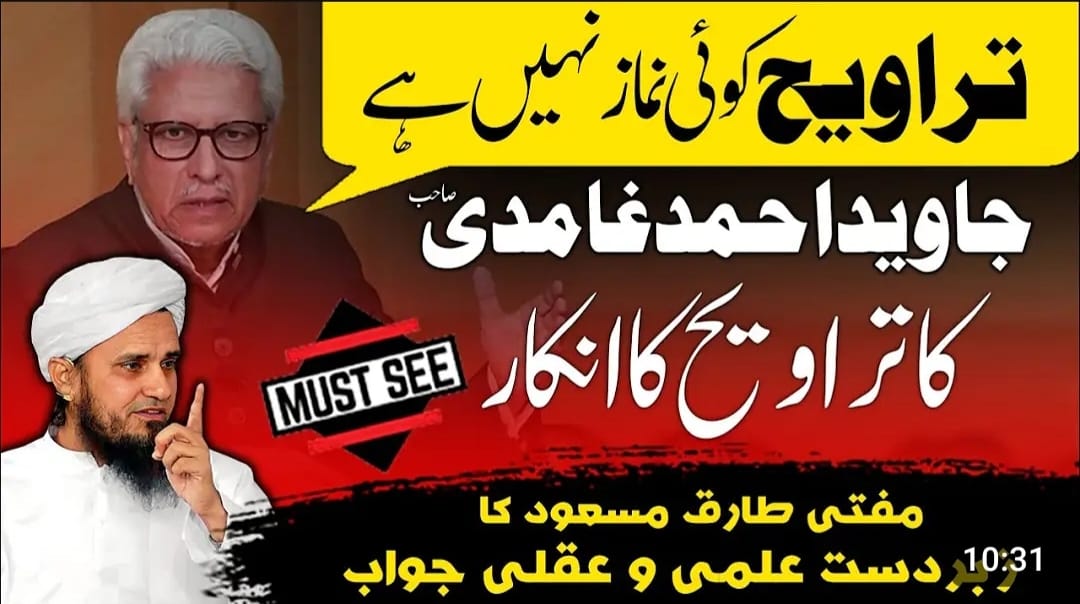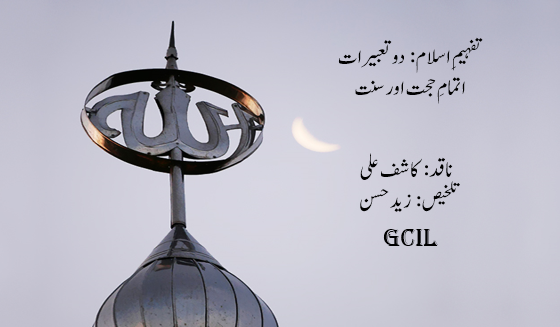ڈاکٹر حافظ محمد زبیر صاحب تلخیص : زید حسن اس ویڈیو میں سپیکر حافظ محمد زبیر صاحب نے " بعض افراد" کے اس دعوے کہ آپ کی تفہیمِ غامدی درست نہیں ، کو...


ڈاکٹر حافظ محمد زبیر صاحب تلخیص : زید حسن اس ویڈیو میں سپیکر حافظ محمد زبیر صاحب نے " بعض افراد" کے اس دعوے کہ آپ کی تفہیمِ غامدی درست نہیں ، کو...

ڈاکٹر نعیم الدین الازہری صاحب تلخیص : زید حسن رمضان المبارک کی بابرکت ساعات میں امتِ مسلمہ روزے اور عبادات میں مشغول ہے ، لیکن سوشل میڈیا پر چند...

مفتی طارق مسعود صاحب تلخیص : زید حسن مسئلہ پوچھا گیا ہے کہ کیا تراویح کی نماز یوٹیوب پر لگا کر اسکی اقتداء میں پڑھ سکتے ہیں؟یہ غامدی صاحب نے نیا...

مفتی طارق مسعود صاحب تلخیص : زید حسن غامدی صاحب نے یہ بات کی ہے کہ تراویح سرے سے کوئی نماز ہی نہیں ہے ۔ اور اسکی ابتداء حضرت عمر کے دور میں ہوئی ہے۔...

ناقد : کاشف علی تلخیص : زید حسن غامدی صاحب سے جزئیات پر بات نہیں ہو سکتی ۔ دین کی دو تعبیرات ہیں ۔ ایک تعبیر کے مطابق اسلام سیاسی سسٹم دیتا ہے ۔...

ناقد : مولانا اسحق صاحب تلخیص : زید حسن اول ۔ یہ کہنا کہ جمعہ کا منبر علماء سے واپس لے لینا چائیے کیونکہ اسلامی تاریخی میں جمعہ کے منبر کا علماء کے...
Caliphate
[Written in response to criticisms of “Islam and the State: A Counter Narrative.”]
There is no doubt that the term ‘Caliphate’ has been in use for many centuries, but it is by no means a religious term. Religious terms are not coined by figures such as Razi, Ghazali, Mawardi, Ibn Hazm, or Ibn Khaldun, nor does any word become a religious term simply because Muslims begin to use it in a particular sense.
They are coined by God and His messengers and are only accepted when their terminological meaning is proven through the its provenance in the texts of the Quran and Hadith or other divine scriptures. Terms like Fasting (Sawm), Prayer (Salat), and Hajj & Umrah are religious terms because they have been given this status by God and His messengers, and are used everywhere in their terminological sense. In contrast, the word “Caliphate” is an Arabic word used in the sense of representation, succession, and governance. These are its lexical meanings, and everywhere in the Quran and Hadith, it has been used in one of these lexical meanings.
Therefore, when verses of the Quran are translated to present the words ‘Caliph’ and ‘Caliphate’ in a specific terminological sense, it is an attempt to convince people that the Quran itself uses these terms in that way. However, a review of any authoritative translation or interpretation will make it unmistakably clear that this is not the case—leaving one, as it did a learned critic of mine, utterly without words. Here, I present translations from two respected scholars for consideration:
The terms “vicegerent” and “ruler” in these verses are translations of khalifa and istikhlaf, and it is clear that they do not carry any religious meaning, unless someone dares to claim that every word used in the Quran turns into a religious term because of that usage.
The same is the case with Hadiths and traditions. In them also, the word “Caliphate” and all its derivatives have been used in the meanings mentioned above, to the point where the term khalifa meaning “successor” has also been used for Allah Almighty. This is why to convey the notion of ‘rightly guided governance’ or ‘governance on the method of prophethood’, the word alone is not sufficient; expressions like ‘Righteous’ (Rashidah) and ‘Upon the methodology of Prophethood’ (ala minhaj al-nubuwwah) have to be added.
Thus, considering such expressions as implicit, our scholars have made “Caliphate” into a term. In this regard, it can certainly be a term in the Muslim political or social sciences, as are terms in Fiqh, Kalam, Hadith, and other disciplines, but it cannot become a religious term. Nobody other than God and His Messengers have the authority to designate a word as a religious term. Such a claim about a word being a religious term can only be established through their statements and not proven, say, through the Muqaddimah of Ibn Khaldun.
As for the argument that there should be only one government for Muslims in the world and that this is an Islamic command, every person familiar with the Quran knows that it is completely devoid of any such command. However, there are two Hadiths presented in its favor: one of them states that prophets governed the Children of Israel; when one prophet passed away, another succeeded him, but after me, there is no prophet, though there will be rulers, and many of them. It was asked: “What do you command us concerning them?” He replied: “Fulfill your pledge of allegiance to the first, then to the one who follows him.”* The second states that “If allegiance is sworn to two rulers, kill the latter.”
Even though much can be said about this second Hadith in terms of its chain of narration, let’s assume for the sake of argument it’s valid; yet it is an undeniable fact that these Hadiths do not convey the message that is attempted to be derived from them. What they state is that if Muslims pledge their allegiance to someone for their governance and thereafter, someone else rebels and puts himself forward, inviting people to pledge allegiance to him, every Muslim should adhere to the first pledge. And if the second person declares his governance and some people also pledge allegiance to him, then he should be killed.
It is clear that these are instructions whose rationality can be clarified to every person. Therefore, after the passing of the Prophet Muhammad (peace be upon him), when a person from the Ansar suggested that one ruler should be appointed from both the Ansar and the Muhajirin, Umar based on the same principle stated that this would be like having two swords in one sheath, and Siddiq-e-Akbar (may Allah be pleased with him) also warned people on this occasion that two rulers cannot exist in one state. Because the result would be that severe disagreements will arise, discord will increase instead of reconciliation, the entire order will be scattered, and it will replace the method on which the Prophet Muhammad (peace be upon him) had left the people, that two people are ruling in the same state.
If these narrations are correctly attributed to the Prophet of God, then what he said was exactly this. From these, it cannot be logically concluded that Islam has commanded its followers to establish only one government in the world, and if the callers to Islam ever succeed in converting the majority of the people of America, Britain, or any other country in the world to Islam, according to these Hadiths and traditions, they cannot establish their own separate government in their country, and if they do, they will be sinning, as is the case with nearly fifty Muslim-majority countries today.
Scholars should be cautious that whatever has been ordained by God’s religion, it should be kept as it is. It is not the right of any scholar, jurist, or Hadith expert to make people responsible for something that their Lord has not made them responsible for. Hence, I have written and am repeating again that the establishment of a United super-state out of countries where Muslims are in majority can be a desire for each of us, and we can also strive to achieve it, but there is no basis for the idea that it is a commandment of Islamic Shariah, the violation of which makes Muslims guilty of sin.
[2015]
:Reference
All quality educational content on this site is made possible only by generous donations of sponsors like you. In order to allow us to continue our effort, please consider donating whatever you can!
We work day in and day out to produce well-researched, evidence based, quality education so that people may gain the correct understanding of their religion. But our effort costs a lot of money! Help us continue and grow our effort so that you may share in our reward too!
Supremacy of the Parliament [Written in response to criticisms of "Islam...
Islam and Nationality [Written in response to criticisms of "Islam and...
Caliphate [Written in response to criticisms of "Islam and the State: A...